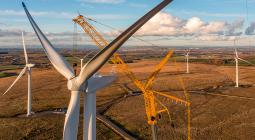Labour to end energy consumer 'rip-off' and renationalise network

Jeremy Corbyn and Rebecca Long-Bailey will say heat and electricity are a human right.
Labour will announce plans on Thursday to seize back control of Britain’s energy network from private shareholders in an effort to fight climate change and end fuel poverty.
Jeremy Corbyn and the shadow business secretary, Rebecca Long-Bailey, are expected to say that heat and electricity should be a human right for all and nationalisation of the network is key to decarbonising the economy.
Under Labour’s plan, companies that control the UK’s £62bn energy infrastructure – the pipes and cables that supply homes and businesses with gas and electricity – would be taken back into state control soon after a Labour election win.
This would include National Grid, and the network arms of Scottish Power and SSE, with the existing investors in those companies to be reimbursed with government bonds at a price determined by parliament.
Nationalisation of the energy networks forms a central part of Labour’s plans to address climate change, with the party arguing that the profits generated from the infrastructure should be invested in the green economy rather than given to shareholders in the form of dividends.
Long-Bailey will say energy customers have been “ripped off” by the privatisation of the UK’s energy grid, with shareholders paid £13bn in dividends over the past five years.
“It’s an insult and an injustice to our people and our planet for companies operating the grid to rip customers off, line the pockets of the rich and not invest properly in renewable energy,” she will say.
“Only by taking the grid into public ownership can we decarbonise the economy at the pace needed to secure the planet for our children and grandchildren while ending the rip off, creating good jobs in local communities and making heating and electricity a human right.”
However, the CBI said Labour’s plans would make the country poorer, hinder efforts to tackle climate change and threaten a return to the frequent power cuts of the past.
Matthew Fell, the business lobby group’s chief UK policy director, said: “These proposals amount to hanging a ‘closed’ sign above the UK, with renationalisation delivering a triple whammy neither citizens nor the country can afford.
“Much-needed investment is drying up under Labour’s threats, which seriously risks hampering efforts to tackle climate change and puts in doubt the innovation that will deliver a net-zero carbon economy.
“These plans would threaten significant improvements in network resilience made since privatisation. No one wants a return to the frequent power cuts that were a feature of nationalised industries of yesteryear.”
It is thought Labour believes it will be possible to pay a price below the stock market value of the companies in question, by deducting a range of items such as pension fund deficits and state subsidies paid out to energy firms since privatisation.
Under Labour’s plans, the energy network companies would be brought under the control of a new national energy agency, which would oversee the party’s target of 60% renewable energy by 2030 and zero net carbon by 2050.
The agency would also oversee a network of 14 regional entities tasked with ensuring every household can access affordable energy. The local agencies would be responsible for initiatives including the roll-out of electric car charging infrastructure.
However, National Grid said nationalisation of energy networks would only hinder the progress already made in Britain’s shift towards renewable energy.
The company, which will publish its latest financial results on Thursday, said: “National Grid is one of the most reliable networks in the world. We are also at the heart of the decarbonisation agenda. Only a few days ago we broke the record for the longest period of time the country has gone without coal generation.
“These proposals for state-ownership of the energy networks would only serve to delay the huge amount of progress and investment that is already helping to make this country a leader in the move to green energy.”
A spokeswoman for SSE said: “Aside from extensive disruption, paying for state ownership and control of energy networks would require full compensation for owners at great expense to taxpayers, or risk destabilising UK-listed utilities, which most pensions are invested in. Neither are in the public interest.
“Electricity networks are 17% cheaper than before privatisation and more reliable thanks to £100bn of investment by private companies like SSE – all funded by private capital investment and not a penny in public debt at the expense of the NHS or schools.”
15 May 2019
![]()




